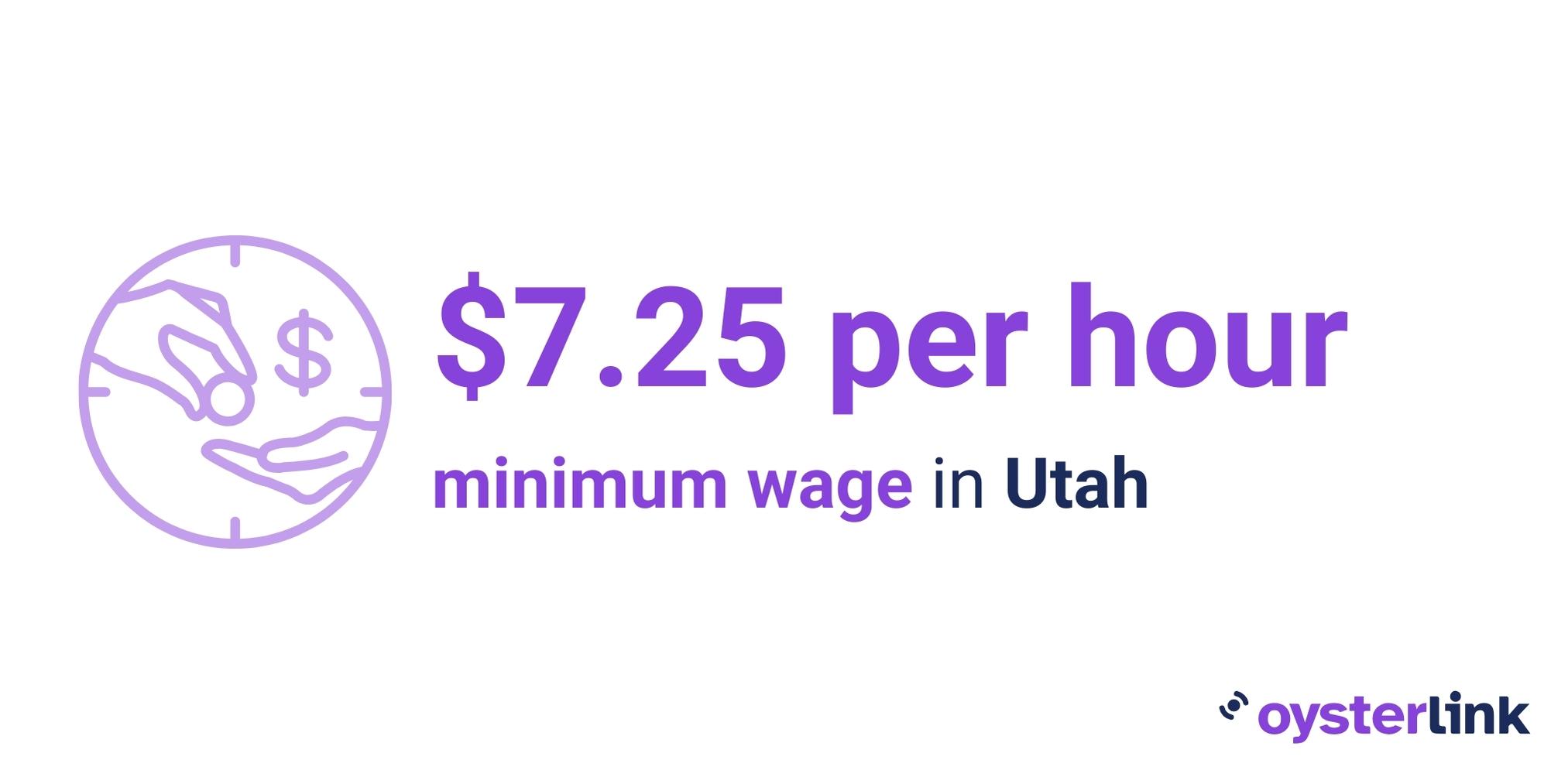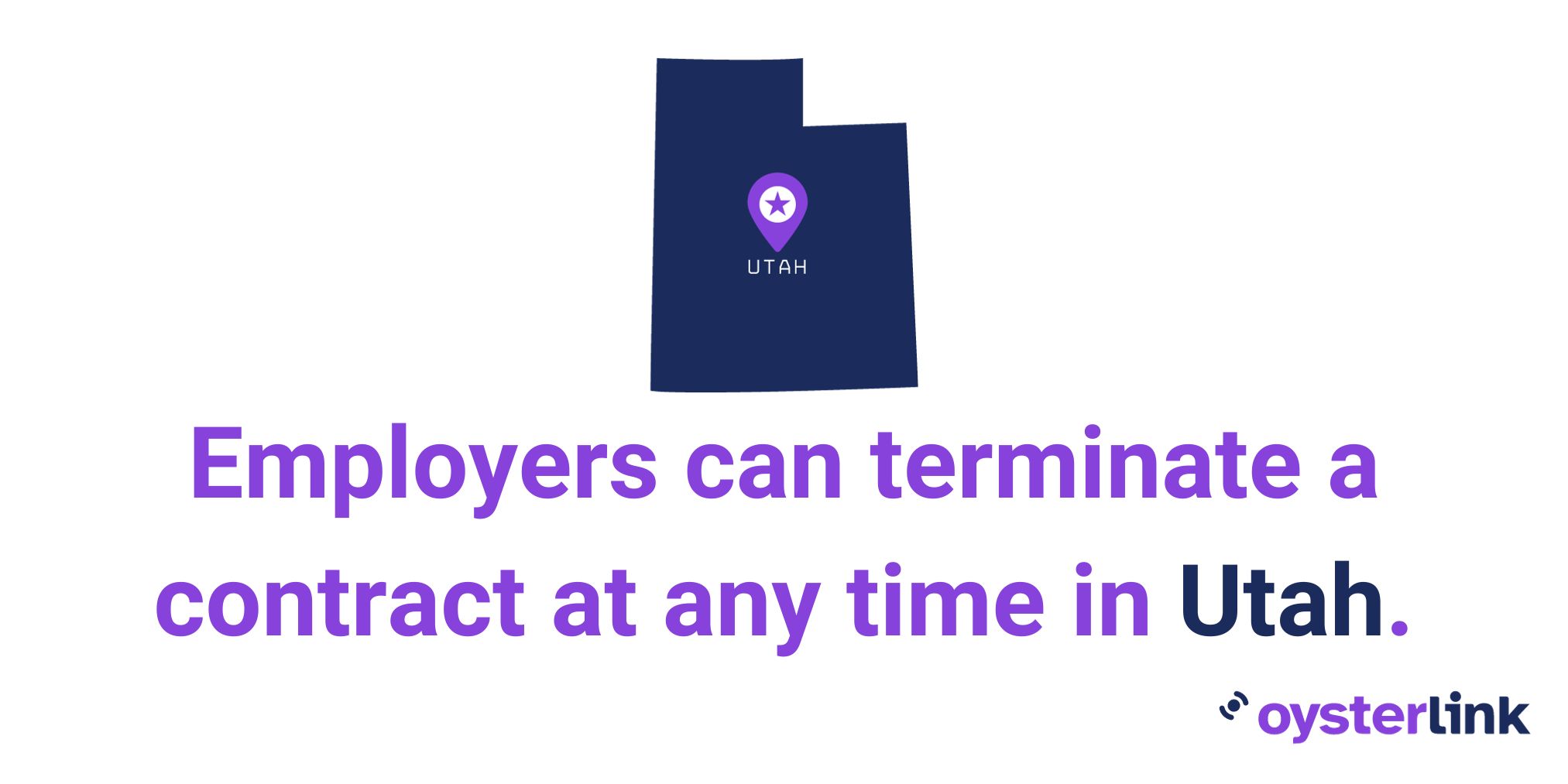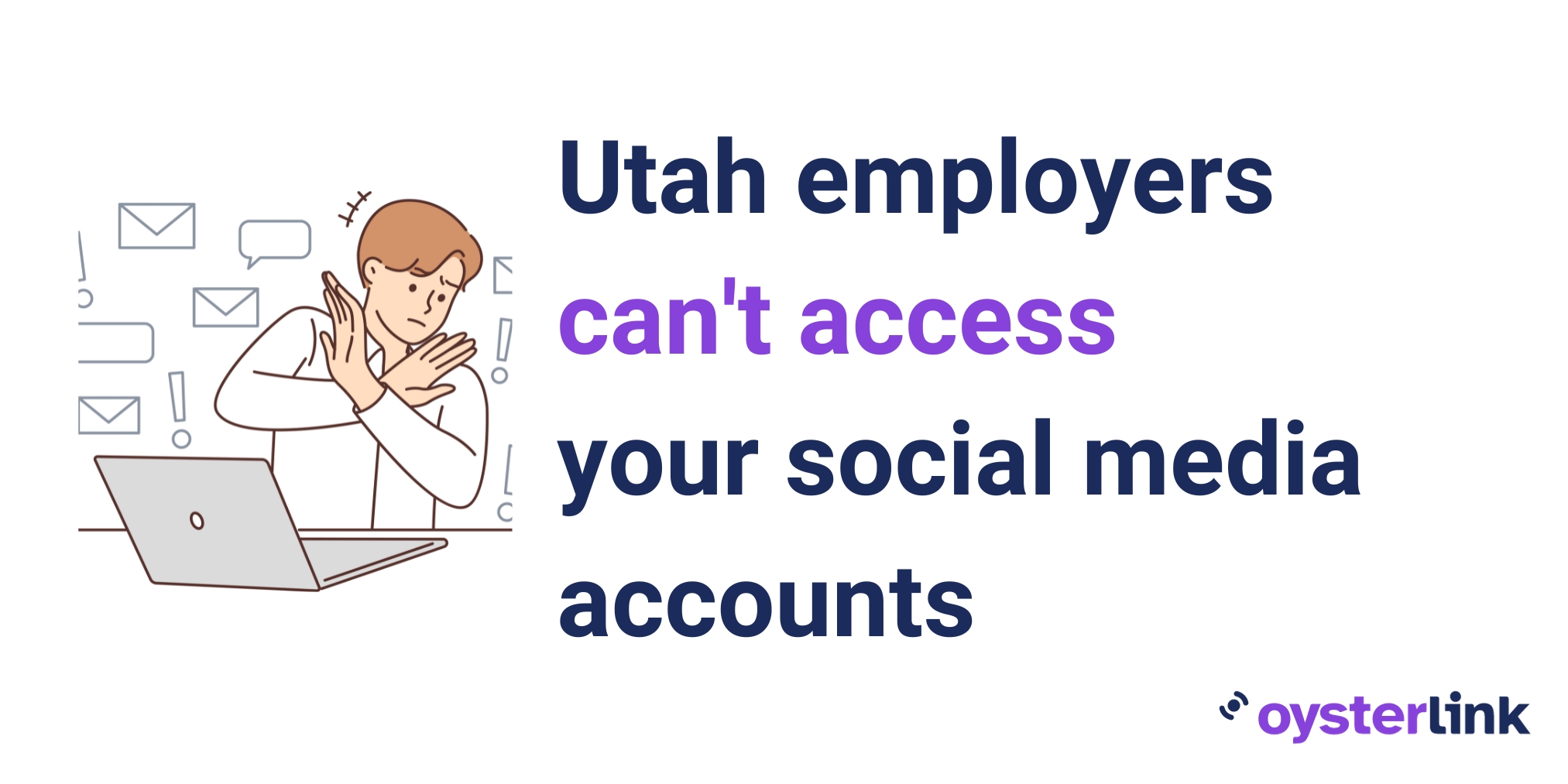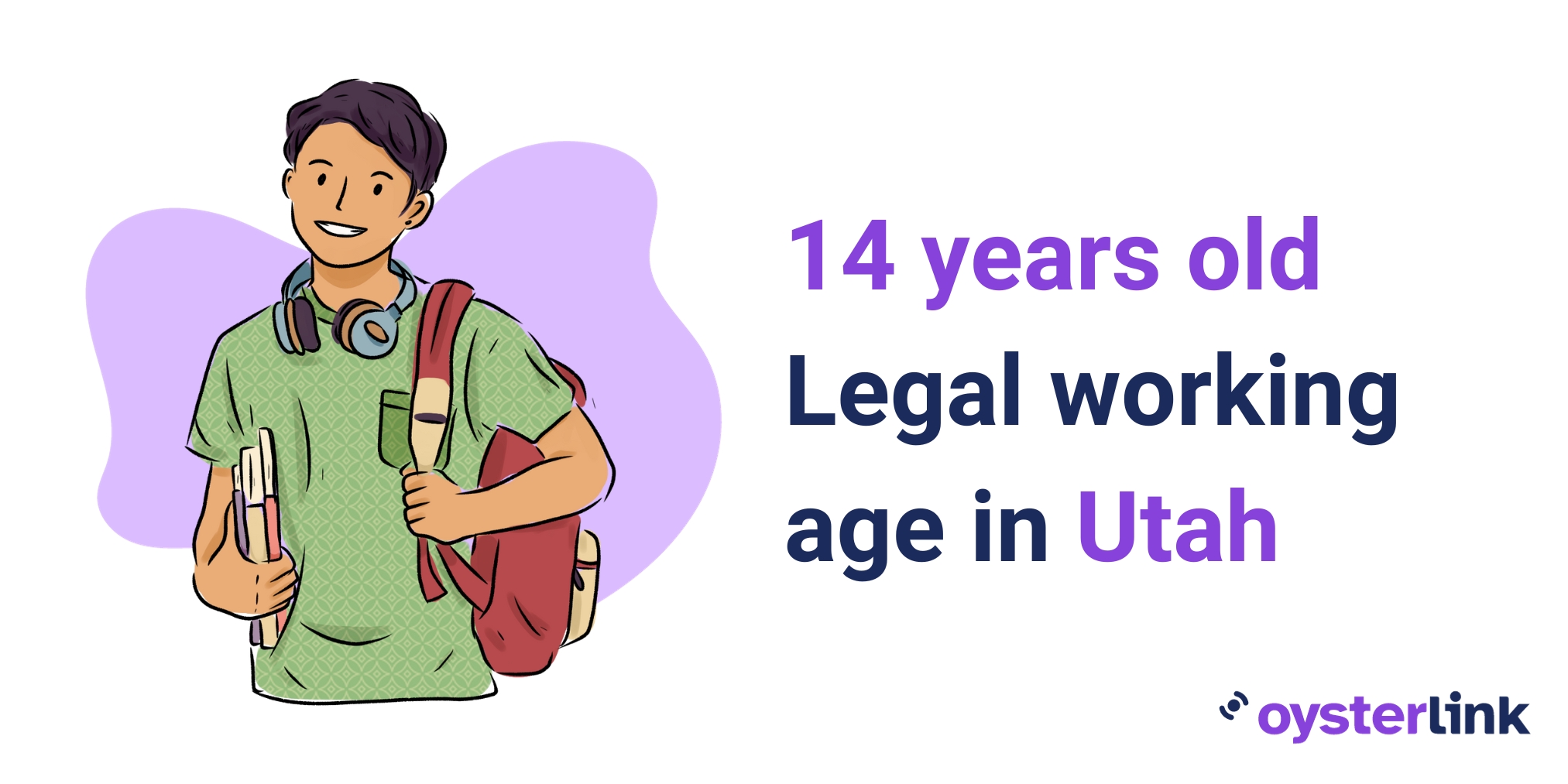A comprehensive guide to Utah labor laws: Covering key topics including minimum wage regulations, overtime provisions, mandated breaks, hiring and termination procedures and other miscellaneous employment laws.
Key Takeaways of Utah Labor Laws
- The minimum wage in Utah is currently at $7.25 per hour, which follows the federal wage.
- Employers are not required to provide rest and meal breaks to employees in Utah.
- Nonexempt employees are entitled to receive overtime pay equal to 1.5 times their regular pay for hours exceeding 40 in 1 workweek.
- Employees can be terminated without cause in Utah, as it is an at-will employment state.
- Employees cannot be compelled to join or support a union as a condition of employment, as it is a right-to-work state.
- Employers must allow time off for jury service and voting.
Minimum Wage Regulations in Utah
Utah’s minimum wage law in 2023 is aligned with federal regulations when it comes to minimum wage regulations, with varying rates for regular and tipped employees.
Utah law defers to the federal minimum wage rate through administrative action, omitting specific dollar amounts.
Utah’s minimum wage laws ensure fair compensation for all employees, and noncompliance can result in penalties for the employer.
[Source: FRED]
This map is interactive. Hover your mouse over different parts of the map to see detailed data.
Both employees and employers need to grasp these regulations to uphold a just and equitable work environment.
Regular Employees
Regular employees in Utah are offered the current state minimum wage of $7.25 per hour. They typically receive a fixed hourly wage or salary.

[Source: U.S. Department of Labor]
Tipped Employees
Tipped employees in Utah can receive a base wage of $2.13 per hour. Tipped employees include workers such as bussers and valets—workers who typically receive more than $30 per month in tips.
When you add tips to their base wage, it should total at least $7.25 per hour. If the total amount does not reach $5.12 an hour, the employer should make up the difference.
Overtime Rules and Regulations in Utah
A typical workweek comprises 40 hours. Should an employee work more hours, they are entitled to receive an overtime rate of at least 1.5 times their regular hourly wage.
Utah does not have state-specific laws and instead adopts regulations by the federal Fair Labor Standards Act (FLSA).
Nonexempt Employees
Nonexempt employees encompass various categories, such as hourly workers, part-time staff and individuals in specific job roles or industries that do not fall under the exemptions provided by FLSA wage and hour regulations.
Nonexempt employees are eligible for overtime pay at 1.5 times their regular hourly wage for hours worked beyond the standard 40-hour workweek.
Employers in Utah are responsible for accurately tracking and compensating nonexempt employees in accordance with federal guidelines.
Exempt Employees
Those who are considered exempt are typically salaried workers who receive a fixed salary regardless of the number of hours worked and are not eligible for overtime pay.
Exempt employees in Utah, similar to nonexempt employees, are subject to the federal minimum wage rate of $7.25 per hour or $684 per work week.
To be considered exempt, employees must meet specific criteria set by the FLSA, which include job scope, salary and classification.
Employers should accurately classify their employees as exempt or nonexempt to adhere to wage regulations and avoid wage and hour violations and other legal complications.
At-Will Employment in Utah
Utah operates under employment-at-will principles. Either the employer or the employee can terminate the employment relationship at any time, with or without cause and notice, except for reasons prohibited by law and unless there is a specific employment contract in place.

However, employers cannot terminate employees for reasons that independently violate state or federal laws.
Right-To-Work Laws in Utah
Utah is a right-to-work state, which means that an employer cannot condition an employee’s right to work on their affiliation with a labor union or organization.
Employers cannot also impede employees’ rights to organize or engage in collective bargaining through labor organizations.
Rest and Meal Breaks in Utah
Utah labor laws do not require employers to provide specific rest and meal breaks for employees.
Utah employers must adhere to federal rules, so although they are not obligated to provide breaks, they must pay employees for their work time and shorter breaks.
However, if an employer offers a more extended meal break where the employee is entirely relieved of duties, they don’t need to compensate the employee for that time.
Family and Medical Leave Laws
Utah labor laws mostly follow the federal Family and Medical Leave Act (FMLA), which provides eligible employees with up to 12 weeks of unpaid, job-protected leave in a 12-month period for specific family and medical reasons. This allows eligible employees to take a leave in case of the following:
- Serious health condition: To give time for employees to prioritize their well-being
- Family care: To care for an immediate family member with a serious health condition (spouse, son, daughter or parent)
- Childbirth: For the delivery and care of their newborn child
- Adoption: For adoption or foster care matters
- Military exigency: To address matters related to a family member’s (spouse, parent or child) military service
- Military caregiver: Up to 26 weeks of leave in a 12-month period to care for a family member in the military
- Funeral: Employees may file for a leave to attend a funeral of an immediate family member (e.g., spouse, children, parents, etc.).
Other Leave Laws
Here’s a quick overview of various types of leave and how Utah labor laws typically observe them:
- Leave without pay: Utah employees may take leave without pay of no longer than 12 months upon application in writing. For nondisability reasons, the leave may be approved if the employee is expected to return to work.
- Bereavement leave: Employers in Utah may grant a maximum of three workdays following the death of an immediate family member. This is not charged against accrued sick or annual leave.
- Jury duty leave: Employers are prohibited from taking adverse actions against employees who fulfill jury duty responsibilities, and employees should not be forced to use their paid leave for such service, except when not eligible for paid leave per company policies. Utah laws do not require employers to pay employees for time spent on jury duty.
- Voting leave: Utah labor laws mandate employers to provide up to two hours of paid leave for voting, except when employees have a three-hour gap between poll opening and closing times during which they are not on the job.
- Organ donor leave: Utah employees are entitled to up to seven days of paid leave for bone marrow donor duty.
Workplace Safety and Health Regulations in Utah
Utah employers are subject to both federal and state-specific regulations governing safety and health in the workplace.
Occupational Safety and Health Act
Utah adheres to both the Utah Occupational Safety and Health Act and the federal Occupational Safety and Health Act (OSHA), which establishes the framework for ensuring safe and healthful working conditions for employees across the state.
The Utah Occupational Safety and Health Division (UOSH) is responsible for enforcing laws and orders to maintain hazard-free workplaces for all employees in the state. Employers should notify UOSH about work hazards.
[Source: U.S. Bureau of Labor Statistics]
This graph is interactive. Hover your mouse over different parts of the graph to see detailed data.
There were 52 fatal occupational injuries in Utah in 2021, which is about 8% higher compared to 48 in 2020.
[Source: U.S. Bureau of Labor Statistics]
This map is interactive. Hover your mouse over different parts of the map to see detailed data.
In total, the number of fatal injuries in Utah is 49% lower than the average number of fatal injuries in all states at 102 fatal work injuries.
Employee Protections
Utah labor laws provide various protections for employees, including:
- Whistleblower protection: Utah has laws that protect employees from retaliation or adverse consequences for reporting illegal or unsafe activities in the workplace
- Wage payment: Employers should pay employees accurately and on time to avoid penalties. Employees have the right to receive detailed pay stubs that outline deductions and earnings.
- Workers’ compensation: Utah requires employers, with few exceptions, to provide workers’ compensation insurance, which covers employees in case of work-related injuries or illnesses. Employees have the right to file workers’ compensation claims for injuries sustained on the job.
- Union activity: It’s important to note that participating in unions is entirely voluntary and should not be mandatory for employees by employers or any other entity. Employees who choose to participate in unions are shielded from employer retaliation.
- Privacy rights: Employers must respect privacy rights within legal boundaries (e.g., personal belongings, communications, etc.). Utah also passed the Internet Employment Privacy Act, which prohibits employers from requiring employers or applicants to disclose information for their personal social media accounts.

[Source: Utah Legislature]
Antidiscrimination and Fair Employment Practices in Utah
Promoting a workplace free from discrimination and ensuring fair employment practices are fundamental principles in Utah labor law.
Discrimination in Utah is defined as treating someone differently based on their race, religion, age, gender, disability, national origin, pregnancy and childbirth, sexual orientation or other protected characteristics, as per the Utah Antidiscrimination Act (UADA).
It’s essential to note that personal conflicts or favoritism may not necessarily fall under unlawful discrimination.
These regulations apply to employers with at least 15 employees, with some regulations still extending to employers with fewer employees.
Other Antidiscrimination Laws
Utah labor laws encompass other antidiscrimination laws designed to eliminate bias and promote equal opportunity in the workplace.
Military Protection
There shall be no discrimination following an individual’s military service.
Pregnancy Accommodation
The UADA requires employers with 15 or more employees to provide special accommodations for pregnancy and related situations.
Background Checks
Utah law gives employers the discretion to conduct background checks as part of their hiring process. Most employers are prohibited from requesting criminal histories for employees or applicants.
Independent Contractor Classification in Utah
Properly classifying workers as employees or independent contractors is a critical consideration for Utah employers as misclassification can lead to legal consequences.
Utah courts consider factors such as workers’ compensation, unemployment insurance, tax liability and common law to determine if a worker is an employee or an independent contractor.
As per Utah’s Employment Security Act, an “independent contractor” in Utah is someone engaged in a similar trade or profession, offering services independently and free from employer control.
To report employee misclassification, notify the Utah Labor Commission.
Official Holidays in Utah
As observed in most U.S. states, private employers in Utah are not required to provide paid or unpaid leave for holidays. Employees may also be required to work during holidays as necessary.
Note that many employers in Utah do extend the benefit of paid holidays to their staff.
| Date | Holiday |
|---|---|
| January 1 | New Year’s Day |
| 3rd Monday in January | Dr. Martin Luther King, Jr. Day |
| 3rd Monday in February | Washington and Lincoln Day |
| Last Monday in May | Memorial Day |
| July 4 | Independence Day |
| July 24 | Pioneer Day |
| 1st Monday in September | Labor Day |
| 2nd Monday of October | Columbus Day |
| November 11 | Veterans Day |
| 4th Thursday in November | Thanksgiving Day |
| Day after Thanksgiving | Thanksgiving Friday |
| December 25 | Christmas Day |
[Source: Utah Legislature]
Termination and Final Paychecks
Employers in Utah must pay unpaid wages to their employees within 24 hours of termination. This can be done by mailing the wages with a postmark within one day, initiating direct deposit or hand-delivering the wages.
Additionally, accrued but unused leave, severance payments and bonuses are considered wages and must be paid upon termination unless an employer has a policy stating otherwise.
For both employers and employees to transition smoothly and without legal issues, it is important to comprehend the nuances of termination and final paycheck requirements.
When navigating Utah labor laws and termination procedures, ensure you’re equipped with financial clarity. Our Paycheck Calculator allows you to estimate your earnings after accounting for taxes and deductions tailored to your state’s tax laws.
Disclaimer: Please note that this paycheck calculator is designed to provide an estimate and should not be considered as professional tax advice. The actual withholding amounts and taxes owed may vary depending on individual circumstances and other factors. For accurate and personalized tax advice, we recommend consulting with a tax professional.
Miscellaneous Utah Labor Laws
Utah labor laws encompass a variety of regulations that address specific aspects of employment and labor relations.
Immigration Verification
As of 2022, Utah requires all employers to use E-Verify for verifying employee eligibility under Utah’s E-Verify law, with an exception for foreign nationals with an H-2A or H-2B visa.
Drug Testing
As per the Utah Drug and Alcohol Testing Act (UTDATA), private employers in Utah may require drug and alcohol tests for employees.
Those complying with UTDATA are protected from specific liability claims.
Smoking Laws
The Utah Indoor Clean Air Act (UICAA) enforces stringent regulations against smoking and vaping or hookahs within indoor public spaces, such as workplaces, with only rare exceptions permitted.
Employers should also post “No Smoking” signs at all public entrances of their establishments.
Gun Laws
Utah law permits individuals with valid concealed handgun licenses to store firearms and ammunition in their private vehicles parked on their employer’s property, with specific storage requirements.
This does not apply to school premises, government entities and religious organizations.
Frequently Asked Questions About Utah Labor Laws
What is the legal working age in Utah?
The minimum employment age in Utah is 14 years old. Occupations for minors are limited.

[Source: Utah Legislature]
How many hours can you work in Utah?
As per federal law and Utah labor laws, eligible employees can work for 40 hours in a work week, and any time exceeding that counts as overtime.
Can you be fired without cause in Utah?
As long as the termination is not due to discriminatory reasons, an employer in Utah can fire an employee for any or no reason.
This is because Utah is an employment-at-will state, which means that either the employer or the employee can end the employment relationship at any time and for any lawful reason without the need for prior notice or cause.
Do salaried employees get overtime in Utah?
Many salaried employees are categorized as exempt and are not entitled to overtime pay.
However, if you do not meet the salary requirements or at least $684 per week, as required by the FLSA, then you will not be considered exempt and will, therefore, be eligible for overtime pay.
Do you need a work permit in Utah?
You do not need a work permit in Utah as an adult or a minor. Minors should provide documents that prove their age.
On the other hand, foreign nationals should seek a work visa to live and work in the U.S. legally.
Disclaimer: This information serves as a concise summary and educational reference for Utah labor laws. It does not constitute legal advice. For personalized legal guidance, it is recommended to consult with an attorney.
Labor Laws By State
- Alabama Labor Laws
- Alaska Labor Laws
- Arizona Labor Laws
- Arkansas Labor Laws
- California Labor Laws
- Colorado Labor Laws
- Connecticut Labor Laws
- Delaware Labor Laws
- Florida Labor Laws
- Georgia Labor Laws
- Hawaii Labor Laws
- Idaho Labor Laws
- Illinois Labor Laws
- Indiana Labor Laws
- Iowa Labor Laws
- Kansas Labor Laws
- Kentucky Labor Laws
- Louisiana Labor Laws
- Maine Labor Laws
- Maryland Labor Laws
- Massachusetts Labor Laws
- Michigan Labor Laws
- Minnesota Labor Laws
- Mississippi Labor Laws
- Missouri Labor Laws
- Montana Labor Laws
- Nebraska Labor Laws
- Nevada Labor Laws
- New Hampshire Labor Laws
- New Jersey Labor Laws
- New Mexico Labor Laws
- New York Labor Laws
- North Carolina Labor Laws
- North Dakota Labor Laws
- Ohio Labor Laws
- Oklahoma Labor Laws
- Oregon Labor Laws
- Pennsylvania Labor Laws
- Rhode Island Labor Laws
- South Carolina Labor Laws
- South Dakota Labor Laws
- Tennessee Labor Laws
- Texas Labor Laws
- Utah Labor Laws
- Vermont Labor Laws
- Virginia Labor Laws
- Washington Labor Laws
- West Virginia Labor Laws
- Wisconsin Labor Laws
- Wyoming Labor Laws
- District of Columbia DC Labor Laws